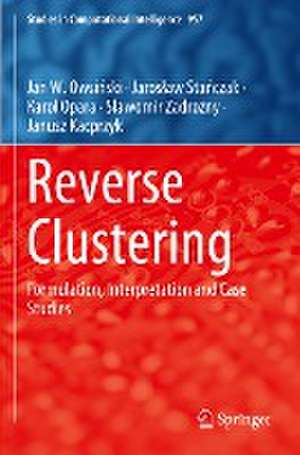Reverse Clustering: Formulation, Interpretation and Case Studies: Studies in Computational Intelligence, cartea 957
Autor Jan W. Owsiński, Jarosław Stańczak, Karol Opara, Sławomir Zadrożny, Janusz Kacprzyken Limba Engleză Paperback – 5 mar 2022
| Toate formatele și edițiile | Preț | Express |
|---|---|---|
| Paperback (1) | 921.34 lei 6-8 săpt. | |
| Springer International Publishing – 5 mar 2022 | 921.34 lei 6-8 săpt. | |
| Hardback (1) | 927.59 lei 6-8 săpt. | |
| Springer International Publishing – 4 mar 2021 | 927.59 lei 6-8 săpt. |
Din seria Studies in Computational Intelligence
- 20%
 Preț: 449.37 lei
Preț: 449.37 lei - 20%
 Preț: 1158.26 lei
Preț: 1158.26 lei - 20%
 Preț: 986.66 lei
Preț: 986.66 lei - 20%
 Preț: 1452.76 lei
Preț: 1452.76 lei - 20%
 Preț: 168.78 lei
Preț: 168.78 lei - 20%
 Preț: 1291.10 lei
Preț: 1291.10 lei - 18%
 Preț: 1112.30 lei
Preț: 1112.30 lei - 20%
 Preț: 565.39 lei
Preț: 565.39 lei - 20%
 Preț: 649.28 lei
Preț: 649.28 lei - 20%
 Preț: 1047.73 lei
Preț: 1047.73 lei - 20%
 Preț: 1578.96 lei
Preț: 1578.96 lei - 20%
 Preț: 643.50 lei
Preț: 643.50 lei - 20%
 Preț: 657.49 lei
Preț: 657.49 lei - 20%
 Preț: 993.28 lei
Preț: 993.28 lei - 20%
 Preț: 990.80 lei
Preț: 990.80 lei - 20%
 Preț: 989.96 lei
Preț: 989.96 lei - 20%
 Preț: 1165.69 lei
Preț: 1165.69 lei - 20%
 Preț: 1444.52 lei
Preț: 1444.52 lei - 20%
 Preț: 1041.96 lei
Preț: 1041.96 lei - 20%
 Preț: 1047.73 lei
Preț: 1047.73 lei - 20%
 Preț: 1046.06 lei
Preț: 1046.06 lei - 18%
 Preț: 2500.50 lei
Preț: 2500.50 lei - 20%
 Preț: 989.13 lei
Preț: 989.13 lei - 20%
 Preț: 1165.69 lei
Preț: 1165.69 lei - 20%
 Preț: 1164.05 lei
Preț: 1164.05 lei - 20%
 Preț: 1042.79 lei
Preț: 1042.79 lei - 20%
 Preț: 1460.19 lei
Preț: 1460.19 lei - 18%
 Preț: 1403.52 lei
Preț: 1403.52 lei - 18%
 Preț: 1124.92 lei
Preț: 1124.92 lei - 20%
 Preț: 1039.47 lei
Preț: 1039.47 lei - 20%
 Preț: 1008.11 lei
Preț: 1008.11 lei - 20%
 Preț: 1045.25 lei
Preț: 1045.25 lei - 20%
 Preț: 1275.42 lei
Preț: 1275.42 lei - 20%
 Preț: 1040.32 lei
Preț: 1040.32 lei - 20%
 Preț: 988.32 lei
Preț: 988.32 lei - 20%
 Preț: 1169.79 lei
Preț: 1169.79 lei - 20%
 Preț: 1162.37 lei
Preț: 1162.37 lei - 20%
 Preț: 1059.26 lei
Preț: 1059.26 lei - 20%
 Preț: 1164.05 lei
Preț: 1164.05 lei - 20%
 Preț: 1166.52 lei
Preț: 1166.52 lei - 20%
 Preț: 1459.38 lei
Preț: 1459.38 lei - 18%
 Preț: 1005.74 lei
Preț: 1005.74 lei - 20%
 Preț: 997.38 lei
Preț: 997.38 lei - 20%
 Preț: 1055.94 lei
Preț: 1055.94 lei - 20%
 Preț: 1284.47 lei
Preț: 1284.47 lei - 20%
 Preț: 994.08 lei
Preț: 994.08 lei - 20%
 Preț: 1048.72 lei
Preț: 1048.72 lei - 20%
 Preț: 1066.02 lei
Preț: 1066.02 lei - 20%
 Preț: 943.78 lei
Preț: 943.78 lei - 20%
 Preț: 1173.10 lei
Preț: 1173.10 lei
Preț: 921.34 lei
Preț vechi: 1151.68 lei
-20% Nou
Puncte Express: 1382
Preț estimativ în valută:
176.30€ • 188.52$ • 146.99£
176.30€ • 188.52$ • 146.99£
Carte tipărită la comandă
Livrare economică 18 aprilie-02 mai
Preluare comenzi: 021 569.72.76
Specificații
ISBN-13: 9783030693619
ISBN-10: 3030693619
Ilustrații: XVII, 101 p. 27 illus., 21 illus. in color.
Dimensiuni: 155 x 235 mm
Greutate: 0.18 kg
Ediția:1st ed. 2021
Editura: Springer International Publishing
Colecția Springer
Seria Studies in Computational Intelligence
Locul publicării:Cham, Switzerland
ISBN-10: 3030693619
Ilustrații: XVII, 101 p. 27 illus., 21 illus. in color.
Dimensiuni: 155 x 235 mm
Greutate: 0.18 kg
Ediția:1st ed. 2021
Editura: Springer International Publishing
Colecția Springer
Seria Studies in Computational Intelligence
Locul publicării:Cham, Switzerland
Cuprins
The concept of reverse clustering.- Reverse clustering: the essence and the interpretations.- Case studies: an introduction.- The road traffic data.- The chemicals in the natural environment.- Administrative units, Part I.- Administrative units, Part II.- Academic examples.- Summary and conclusions.
Recenzii
“This brief volume is a concise introduction to a research program that the authors have been conducting into bridging these approaches. … The volume and the method it advocates deserves wide attention by data analysts in domains with a tradition of informal or expert-based classifications.” (H. Van Dyke Parunak, Computing Reviews, May 25, 2022)
Textul de pe ultima copertă
This book presents a new perspective on and a new approach to a wide spectrum of situations, related to data analysis, actually, a kind of a new paradigm. Namely, for a given data set and its partition, whose origins may be of any kind, the authors try to reconstruct this partition on the basis of the data set given, using very broadly conceived clustering procedure. The main advantages of this new paradigm concern the substantive aspects of the particular cases considered, mainly in view of the variety of interpretations, which can be assumed in the framework of the paradigm. Due to the novel problem formulation and the flexibility in the interpretations of this problem and its components, the domains, which are encompassed (or at least affected) by the potential use of the paradigm, include cluster analysis, classification, outlier detection, feature selection, and even factor analysis as well as geometry of the data set. The book is useful for all those who look for new, nonconventional approaches to their data analysis problems.
Caracteristici
Is devoted to Reverse Clustering, developed by the authors and applied to a series of cases based on real-life data Belongs to the broadly understood domain of data analysis – more precisely: classification and cluster analysis Presents Formulation, Interpretation, and Case Studies of Reverse Clustering
